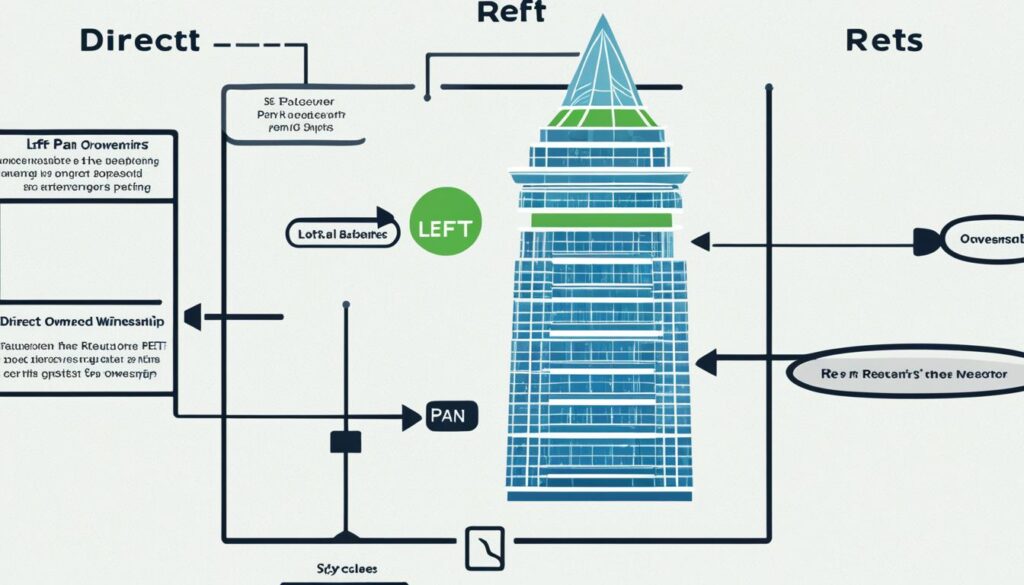Last Updated on: 22nd July 2024, 06:29 pm
Unlock new horizons in wealth building by discovering best ways to invest 30k in property. Whether you are experienced or new to the real estate market, deploying capital wisely in property can set the stage for substantial long-term gains. This guide provides an inside look into strategic and successful property investment with 30k, offering actionable insights to navigate this exciting venture. Act on the potential that investing 30k in property promises and watch as your fiscal foresight matures into valuable assets.
While the concern that only 43 percent of Americans have the savings to manage a sudden $1,000 expense looms1, investing in property remains a beacon of financial prudence for those looking to secure a more stable future. The sheer diversity of the real estate market offers multiple avenues to curate a portfolio that not only mitigates risk but stands to appreciate over time, presenting an attractive scenario for those who can balance immediate financial commitments with a vision for growth.
Key Takeaways
- Identify lucrative opportunities within the property market for a 30k investment.
- Strategies to transition from average credit card balances to significant property assets.
- Explore the benefits of direct property ownership over more liquid investment alternatives.
- Understanding how to create diverse investment portfolios to hedge against uncertainty.
- Financial preparation for property investment is crucial in the face of shifting market dynamics.
- Utilize available financial tools, such as 529 savings plans, for strategic investment planning.
Exploring the Potential of Real Estate for Your 30K Investment
The allure of real estate as a robust investment avenue is indisputably evident. With a modest sum of $30,000, the real estate investment potential can unlock a diverse array of lucrative ventures, ranging from rental properties to burgeoning commercial spaces. Beyond sheer profit, the benefits of real estate investment encompass both income generation and capital growth, serving as a compelling argument for investing 30k in real estate.
An inspiring success story that resonates with potential investors is that of a real estate investor who, through astute investments, grew a portfolio of 61 rental units, grossing $431,000 in rental income annually2. This investor began their journey with a $295,000 single-family home and gradually expanded their holdings, underscoring the significant upside to diligent and strategic property investment2.
This individual’s strategy hinged on the “BRRRR” method: Buy, Rehab, Rent, Refinance, Repeat, a formula which has garnered recognition for its efficacy in realizing the real estate investment potential. Furthermore, the investor emphasized geographic diversification, investing in Midwest markets like Ohio and Kentucky, targeting undervalued multi-unit properties that maximized the use of every dollar invested2.
Pooling resources with small family-owned management businesses, the investor capped management costs at an average of 7% of the gross rent per property. Such collaborations can be particularly beneficial when investing 30k in real estate, as they help streamline property management, allowing investors to focus on portfolio expansion and strategic decisions2.
One might ponder the tangible benefits of real estate investment when orchestrated with precision. Our highlighted investor, after deductions for mortgages, taxes, and maintenance, nets approximately $6,000 monthly in passive income2. This outcome demonstrates how well-applied knowledge and strategic funding can foster a self-sustaining investment ecosystem, laying the groundwork for financial sovereignty.
The following table illustrates a comparative snapshot of the investor’s growth, reflecting how a focused approach to property investing yields tangible results:
| Year | Properties Owned | Gross Rental Income ($) | Investment Method |
|---|---|---|---|
| 2014 | 1 | – | Initial Purchase |
| 2016 | 3 | 51,4042 | BRRRR Method |
| Recent | 61 | 431,0002 | BRRRR Method |
Bolstered by these insights, it becomes evident that harnessing the real estate investment potential of a $30,000 investment can set the stage for a prosperous financial future. The definitive aim is financial independence through real estate, achievable through calculated decisions and patient, strategic investing2.
To draw inspiration from a concrete example, you may appreciate the journey of a successful real estate investor elaborated in this CNBC article, where dedication to the craft of property investment paved the path to financial freedom2.
When contemplating on how to invest 30k in real estate, one should consider the transformative potential it holds—a steadfast investment that can yield substantial rewards and pave the way to lasting prosperity.
How to Invest 30k in Property: A Guide to Maximizing Your Investment
Embarking on the journey of investing 30k in property begins with a foundation of knowledge and a commitment to strategic planning. This section will carve out a thoughtful path for those eager to engage in a property investment venture, highlighting how to invest 30k to maximize returns and make every dollar count.
Setting Clear Investment Goals
Understanding your financial horizon and expected outcomes is the cornerstone of any successful investment. A seasoned investor demonstrated this by building a portfolio of 61 rental units, generating substantial passive income2. Start by outlining your objectives, whether seeking passive income, like the $6,000 per month earned from a diverse real estate portfolio, or capitalizing on property appreciation over time. Solid goals help tailor your investment strategies and guide your decisions throughout the process.
Conducting Thorough Market Research
Market research is paramount, as proven by investors who have reaped significant rental incomes, including over $431,000 in a year2. Research encompasses analyzing market trends, tenant demographics, and renter demand, along with understanding economic indicators that affect property values. Consider regions like Ohio and Kentucky, where investments have shown growth and viability. To enhance this knowledge, leverage platforms like All Property Management, which unite investors with local property professionals2.
Understanding the Importance of Location
Location influences both the immediate returns and long-term value of your investment. With strategic placement, you can tap into the wealth-building power of real estate, akin to an immigrant amassing a $100 million portfolio3. Factors like neighborhood safety, proximity to amenities, and the area’s economic health play pivotal roles in property performance. Aim to choose locations that promise appreciation and align with your investment goals.
Invest in areas known for stability and growth to hedge against market fluctuations and attract quality tenants.
Adopting these best ways to invest 30k in property will guide you towards a more profitable and sustainable real estate investment experience. Remember, the path to substantial property investment rewards, such as achieving a net worth significantly higher than non-property owners3, begins with informed decision-making and deliberate action.

Apart from these foundational steps, consider working with family-owned management businesses where personal attention and lower fees, averaging 7%, can enhance your investment’s profitability2. Also, exploring options such as REITs can diversify investment channels, give access to professionally managed properties, and potentially yield returns over 8%3. Ultimately, the route you choose, whether direct property ownership or trust investments, should reflect your personal investment style and financial targets.
Note that dedicated research and prudent management are what enable ways to maximize property investment success, turning 30k into a thriving future asset.
Investment Strategies for Property Beginners
Embarking on your first property investment venture can be as thrilling as it is complex. As someone new to the arena, your priority should be to understand and implement property investment strategies for beginners that resonate with your financial aspirations. One success story, Michael Albaum, demonstrates the potent combination of acumen and strategy, as he grossed an impressive $431,000 in rental income last year from 61 rental units2.
For new property investors seeking a hands-on approach, the “BRRRR” method advised by Albaum, which stands for Buy, Rehab, Rent, Refinance, Repeat, could be a valuable strategy to consider2. This approach encourages starting small with one property and scaling up, ideal for beginners with a cap of $30k for investment.
Investment Approaches for New Property Investors:
- An analysis of market trends to identify properties poised for value appreciation
- Evaluation of renovation needs versus potential rental income
- Understanding the nuances of property management including outsourcing to reliable local property management companies
With the goal of long-term passive income, it’s paramount to focus on properties that necessitate minimal work, allowing for easier management, either personally or through outsourcing to a property management company focusing on boosting market value through cost-effective touch-ups2.
| Year | Properties Owned | Gross Income | Renovation Cost | Monthly Passive Income |
|---|---|---|---|---|
| 2014 | 1 | $295,000 Home Purchase2 | N/A | N/A |
| 2016 | 3 | $51,4042 | $2.5M Total2 | N/A |
| Recent Year | 61 | $431,0002 | Varies | $6,000/month2 |
Reflecting on Albaum’s journey from purchasing his first real estate property in 2014 to owning a plethora of rental units, the transformation underscores the effectiveness of gradual scaling and reinvestment. This expanding portfolio not only grossed significant rental income but also allowed for an approximate $6,000-per-month in passive revenue after expenses, unveiling the tangible impact of astute investment approaches for new property investors2.
As a final note, property investment isn’t merely about the right properties but also the right people. Building a dependable team for property management, tenant sourcing, and renovation work, just as Albaum did, can be the cornerstone of a flourishing property investment journey2.
A solid beginning in property investment echoes the union of a well-conceived strategy with a granular understanding of the market. By following the pathways laid out by seasoned investors and leaning into reliable investment strategies for beginners, even new entrants can carve out a significant presence in the landscape of property investment.
Navigating Property Investment Options with 30k
With a budget of $30,000, determining the optimal path for property investment demands consideration of various modalities, each with its unique benefits and challenges. Whether you’re leaning towards hands-on involvement or favoring a passive approach, understanding the nuances of each option can pave the way for a more informed investment journey.
Direct Ownership versus REITs
Direct ownership of property offers complete control and the potential for significant income and appreciation. For example, Michael Albaum’s venture into direct ownership began with an investment in real estate that grew into 61 rental units, yielding a gross income of $431,000 last year2. However, this route may also incorporate substantial expenses, such as the 7% average he spends on property management fees2. On the other hand, Real Estate Investment Trusts (REITs) provide a more hands-off investment, offering diversification and liquidity without the day-to-day responsibilities of property management.
The Role of Online Platforms and Crowdfunding
Online platforms for property investment allow you to join others in funding specific property investments or portfolios. This collective approach significantly lowers the entry cost, making it feasible for those with $30,000 to partake in larger investments that would otherwise be out of reach. Crowdfunding can act as a bridge, connecting individual investors with property investment opportunities.
Benefits of Diversifying with Tokenized Real Estate
The advent of tokenized real estate marks an evolution in investment opportunities, enabling investors to purchase fractions of property represented by digital tokens. This innovative model offers benefits such as increased liquidity, lower transaction costs, and the opportunity to own a portion of high-value assets that would typically require far more capital investment.

Each investment avenue aligns closely with specific investor profiles and preferred levels of engagement. While direct ownership could lead to robust month-to-month cash flow, as shown by Albaum’s $6,000 monthly passive income2, REITs, online platforms, and tokenized real estate are avenues that offer varying degrees of liquidity, passive income potential, and access to diversification. Careful analysis and strategy are vital when choosing your investment route, ensuring your funds work optimally towards your financial goals.
| Investment Type | Potential Benefits | Considerations |
|---|---|---|
| Direct Ownership | Control over assets, potential for higher income through rental yield and appreciation | Significant upfront capital, active management, higher transaction costs |
| REITs | Liquidity, passive income, diversification without direct management responsibilities | Potential lower returns compared to direct ownership, subject to market fluctuations |
| Online Platforms/Crowdfunding | Lower minimum investments, access to larger deals, collective investment strength | Dependence on platform due diligence, limited control over investment |
| Tokenized Real Estate | Fractional ownership, increased liquidity, potential to invest in high-value assets | Emerging market with regulatory uncertainty, dependent on technology adoption |
Preparing for the Financial Responsibilities of Property Investing
Understanding the financial responsibilities of property investing is fundamental for anyone looking to ensure their venture into real estate remains both profitable and sustainable. Adequate budgeting for property investment plays a critical role in navigating the costs associated not only with the acquisition of property but also the ongoing expenses that come with managing a real estate asset. Entrepreneurs aiming to attract serious investors should consider offering a stake in the equity of their projects—financial advisors recommend an offering between 10-20%, as asking for too little, such as 5%, may not entice the commitment needed4.
Investors typically look for entrepreneurs who not only have a transparent valuation of their business but also a comprehensive understanding of the market and the competition4. A strategic partnership with an investor should facilitate significant business growth, which underscores the importance of managing property expenses proficiently. When seeking investment, showcasing a solid grasp of both operational know-how and industry nuances can set the stage for more equitable negotiations4. As such, entrepreneurs must demonstrate finesse in managing property expenses and forecast cash flow accurately to appeal to investors.
To ensure alignment with business goals and investor expectations, identifying the right investor is just as crucial as the financial aspects of property ventures. An investor who shares the entrepreneur’s vision and understands the potential for growth within the specific property segment can be invaluable4. This partnership can greatly determine the business’s trajectory and the investor’s level of engagement, making the synergy between the two a cornerstone of successful property investment4.
Aspiring property investors can find comprehensive insights on when and how much equity they should offer to investors in this financial guide, which delineates factors such as business valuation, growth potential, and entrepreneurial experience that can influence the decision4.

Risk Management and Due Diligence in Real Estate
The real estate market can present significant financial opportunities, yet it also requires a keen sense of risk management in real estate and thorough due diligence in property investing. A wise investor knows the importance of evaluating risk tolerance and anticipated returns before venturing into real estate investments.

Assessing Risk Tolerance and Return Expectations
Assessing risk tolerance in property investment is a multi-faceted process that involves understanding both financial and market risks. Specialty leasing strategies have led to a percentage increase in revenue, signifying that innovative approaches can open new revenue streams and enhance investment returns5. Additionally, it’s critical to review a comparative analysis of ROI through diligent market opportunity identification, ensuring your investment aligns with your financial goals5.
Building Cash Reserves for Unforeseen Expenses
The ability to adapt to unanticipated costs is a cornerstone of robust risk management in the volatile terrain of real estate. Properties that have utilized technological solutions have reported increased tenant satisfaction, showcasing the need for a contingency fund dedicated to facility upgrades and emergent needs5. A clear understanding of previous emergency response incidents managed by expert teams also plays into effective cash reserve strategies5.
Engaging in Smart Decision-Making with Professional Insights
Smart decision-making in real estate is backed by quality analytics and professional expertise. Services optimizing distressed real estate assets have demonstrated how specialized knowledge can revitalize an investment5. Furthermore, an ample percentage of increased tenant retention through experience management initiatives underlines the importance of aligning strategies with evolving tenant requirements5. A focus on efficiency, tenant satisfaction, and strategic adaptation ensures a pragmatic approach to property investment.
Conclusion
The pursuit of wealth creation and financial growth through property investment is both an exciting and strategic endeavor. In reviewing the avenues of deploying a sum like $30k in property, it’s key to embed within your plan a realistic appreciation for historic market growth rates, which have typically hovered around 6-7% after inflation6. Informed investors activate their capital with not just the knowledge of past trends but with a proactive eye on future forecasts, such as the 4% nominal return anticipated by experts like Jack Bogle over the coming decade6.
Understanding the financial landscape, particularly the potential yearly tax on a taxable portfolio, expected to linger around the 1% mark, is paramount for keeping your investment objectives on track6. Moreover, capital gains tax rates, ranging from 0-15% based on income levels, warrant meticulous planning and strategic foresight6. The approach to investment should pair domestic with international assets, finely balancing them to buffer against market fluctuations while progressing toward bond investments as a hedge in later years6. This is especially pertinent given the higher tax implications for bond dividends, suggesting their placement in tax-advantaged accounts is more tax-efficient6.
Reflecting on your investment strategy is like steering a ship through known and unknown waters – replete with potential and promise, yet demanding respect for the laws of the financial currents. Final thoughts on property investment with 30k cohere around a solid and adaptable strategy that is well-researched and diversely structured. Embrace property investment not just as a transaction, but as a journey that melds calculation with aspiration. This is your conclusion on investing 30k in property – may it be a voyage as profitable as it is rewarding.
FAQ
What are some smart ways to invest 30k in property successfully?
Why should I consider real estate for my 30k investment?
How can I invest 30k in property successfully?
What are some recommended investment strategies for property beginners?
What are my options for investing 30k in property?
How should I prepare for the financial responsibilities of property investing?
What is the role of risk management and due diligence in real estate?
Source Links
- https://www.bankrate.com/investing/best-ways-to-invest-30000/
- https://www.cnbc.com/2022/05/24/this-32-year-old-grosses-431000-per-year-from-real-estate-investments-and-lives-off-passive-rental-income.html
- https://www.upflip.com/blog/how-to-invest-in-real-estate
- https://www.british-business-bank.co.uk/business-guidance/guidance-articles/finance/how-much-equity-should-i-offer-to-investors
- https://www.us.jll.com/en/manage-property-and-portfolio
- https://www.bogleheads.org/forum/viewtopic.php?t=217902
How to Invest:

As a passionate, global-thinking Real Estate Investor I am constantly looking for the best opportunities to invest in Properties. With Aparthotel.com I am building an All-In-One Global Real Estate Platform, where people can analyse, rent or invest in properties. Additionally I help Investors with comparing the best financing options as well as give detailed Consultation on the buying process for Real Estate Investments around the world. I am looking forward to sharing my knowledge on this Website and feel free to reach out to me if you have any questions.

Comments